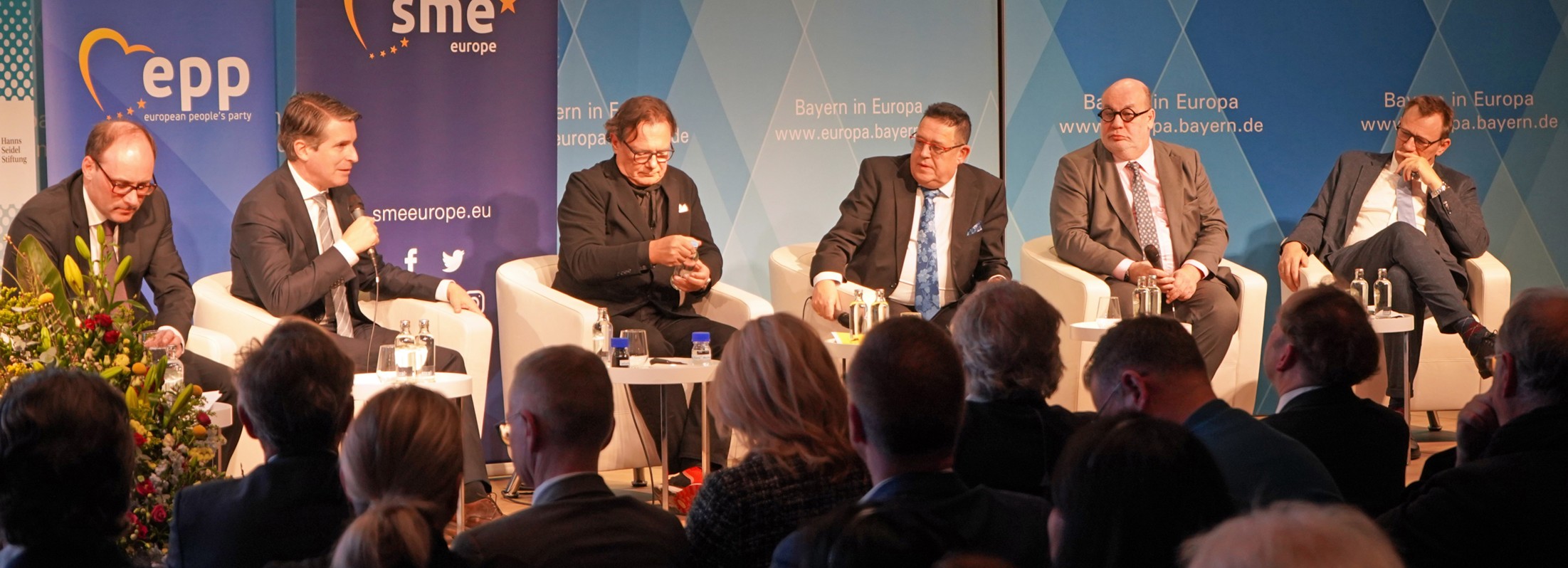Growth Engine Research and Innovation: How Market-Based Solutions Secure Prosperity in Europe

On 19 and 20th February, leaders from politics, business, academia, and civil society came together at the Representation of the Free State of Bavaria to the EU for a two-day conference dedicated to one central question: How can Europe regain its innovative strength and secure long-term prosperity?
The event, hosted by the Taxpayers Association of Europe (TAE), in cooperation with SME Connect and the Hanns Seidel Foundation, the Economic Advisory Council of Bavaria (WBU), the European Economic Senate (EES), and SME Europe of the EPP, attracted around 300 participants from EU institutions, industry, research organizations, and the start-up community.
Opening the conference, Bavaria’s Minister of State for European Affairs, ERIC BEIßWENGER, emphasized that Europe must rethink its growth strategy if it wants to remain globally competitive. He called for a political environment that encourages innovation, reduces regulatory pressure, and strengthens technological neutrality. Beißwenger proposed a new “Growth Deal” centered on streamlined regulation, competitive taxation, and secure energy supply.
MICHAEL JÄGER, President of TAE, reinforced this message by highlighting the challenges faced by founders and SMEs. Excessive regulation and tax burdens, he argued, are driving promising start-ups to scale abroad. Europe’s economic foundation, he warned, is at risk if entrepreneurial activity continues to migrate elsewhere.
A major highlight of the program was the keynote speech by DR. ANDREAS SCHWARZ, Head of Cabinet to the EU Commissioner for Start-ups, Research, and Innovation. Schwarz noted that Europe has fallen behind global competitors due to fragmented research structures and insufficient investment in breakthrough technologies.
He introduced the Commission’s new competitiveness-driven agenda, including:
- A comprehensive EU Start-up Strategy (June 2025)
- A European Innovation Act to speed up the market entry of new technologies (2026)
- A voluntary 28th Regime to simplify cross-border operations for innovative firms
- A strengthened European Research Area Act to reduce R&D fragmentation
- Expansion of the EIC Fund, aiming to mobilize up to €20 billion for deep-tech innovation
According to Schwarz, the new Commission intends to shift from a regulatory role to a proactive strategy that empowers entrepreneurs.
A high-level panel featuring political leaders, researchers, and innovators — including FRANK OBRIST, DR. RICHARD BEYER, NIELS FLEMMING HANSEN MEP, ERIC BEIßWENGER, and DR. ANDREAS SCHWARZ – explored what Europe needs to unlock its potential.
Frank Obrist presented his company’s “Sub-Zero Methanol,” a carbon-negative fuel concept that could significantly support Europe’s energy resilience if given proper regulatory recognition.
Dr. Richard Beyer addressed Europe’s investment gap. He stressed that although global capital is abundant, Europe continues to deter investors with complex taxation and regulatory uncertainty. Clear and predictable rules, he argued, are essential to attract long-term funding for innovation.
Closing the event, DR. INGO FRIEDRICH, President of the European Economic Senate, reminded participants that Europe’s challenge is not a lack of ideas or scientific excellence. Instead, it is the absence of a political and regulatory framework that allows innovation to thrive.
The conference delivered a clear call to action:
Europe can be a global leader in innovation—if it embraces market-driven solutions, reduces bureaucracy, and provides the conditions entrepreneurs need to succeed.